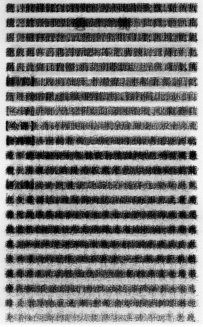Feedbackstage
dal 13/3/2009 al 17/4/2009
Segnalato da
Janet Cardiff
George Bures Miller
William Engelen
Michael Gumhold
Jon Kessler
Idris Khan
Bernhard Leitner
Christian Marclay
Albert Mayr
Joao Penalva
Stephen Prina
Gerwald Rockenschaub
Erwin Thorn
Peter Weibel
Lawrence Weiner
Fiona Liewehr
13/3/2009
Feedbackstage
Galerie Thomas Schulte, Berlin
The exhibition represents an attempt to explore the abolition of the border between the closed and the incomplete. It seeks to be a refusal of the total determination of a real work, defined by temporal and spatial lines, and its sensually limited reception, and represents the desire to develop a discourse without precise limits. Curated by Fiona Liewehr.

Janet Cardiff/George Bures Miller, William Engelen, Michael Gumhold, Jon Kessler, Idris Khan, Bernhard Leitner, Christian Marclay, Albert Mayr, João Penalva, Stephen Prina, Gerwald Rockenschaub, Erwin Thorn, Peter Weibel, Lawrence Weiner
Curated by Fiona Liewehr
In cooperation with Georg Kargl Fine Arts, Vienna
March 14 until April 18, 2009
Opening reception Saturday, March 14, 2009, 5-8 pm
"Everything is music." (John Cage)
The exhibition "Feedbackstage" represents an attempt to explore the abolition of the border between the closed and the incomplete. It seeks to be a refusal of the total determination of a real work, defined by temporal and spatial lines, and its sensually limited reception, and represents the desire to develop a discourse without precise limits.
In various media such as installation, photography, video, and drawing, the artists shown here engage with music and its various "instruments," like the measurement of time, improvisation and interpretation, performance or notation of history and memory.
Curating an exhibition on the subject of music and fine art represents a challenge in several ways. Against the backdrop of the avant-garde currents of the early twentieth century, with its discourse in manifestos and theoretical writings on the dissolution of the genre boundaries between music, theater, film, and the fine arts, there is the danger of becoming formalistic or dogmatic, of succumbing to a renewed establishment of hierarchic relations between the discursive and the visual. During the latter half of the twentieth century, John Cage became the key mediating figure between the fine arts and music, after shattering the term "music" and opened it to neighboring disciplines. His principle of "calculated chance" and the call to "do it yourself" pursued in the Fluxus movement led to an expansion and almost insoluble mixing of realms. Bernhard Leitner for example, originally from the realm of architecture, understands sounds as a construction material, exploring in his experiments the impact of sound architecture on the body of the spectator. He draws new borders in our structure of perception, by organizing the space into zones where certain tones are heard and felt and in zones that are found beyond what is heard.
Performative and actionistic structures of the Fluxus and Happening movement, which extended to the destruction of music instruments with enormous physical exertion on the part of the artists, were omnipresent, both on the rock stage and in the exhibition space. But how far can the "anything goes" strategies directed at the destruction and deconstruction of the representational culture and the establishment of classical music lead before they become arbitrary?
Opening reception Saturday, March 14, 2009, 5-8 pm
Text: Fiona Liewehr
Translation: Brian Currid
Galerie Thomas Schulte
Charlottenstrasse 24 - Berlin
Free admission



